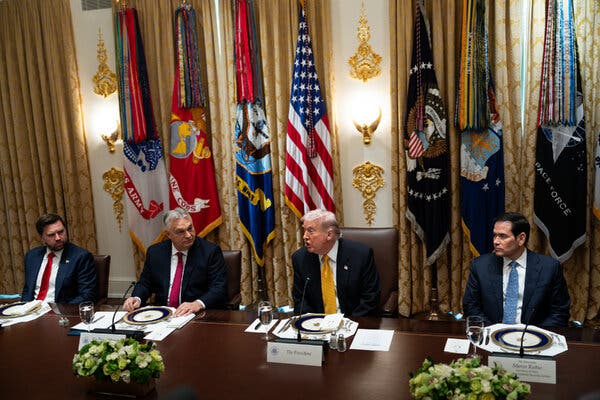
President Donald Trump has granted Hungary a one-year exemption from U.S. sanctions targeting countries that purchase Russian oil. This development follows a meeting with Hungarian Prime Minister Viktor Orban at the White House on March 15, 2024. The exemption is part of a broader set of agreements aimed at addressing Hungary’s energy needs amidst the ongoing conflict in Ukraine.
The sanctions, which have been imposed to pressure Russia to cease its military actions in Ukraine, have raised significant concerns for Hungary’s economy. According to a White House official, who requested anonymity, the extension of the exemption is a significant win for Mr. Orban, who faces a challenging re-election campaign. Shortly after the meeting, Mr. Orban announced the agreement through social media, highlighting Hungary’s need for continued access to Russian energy supplies.
In addition to the sanction exemption, Hungary has committed to purchasing liquefied natural gas from the United States, with contracts valued at approximately $600 million. A fact sheet released by the State Department confirmed this agreement. Mr. Orban stated in his social media post that Mr. Trump had “guaranteed full sanction exemptions” for two of Hungary’s key pipelines, TurkStream and Friendship, which are essential for maintaining low energy prices in the country.
Hungary relies heavily on Russian energy, with imports constituting about 86 percent of its oil supply. This dependency has intensified since Russia’s full-scale invasion of Ukraine in 2022, according to research from the Atlantic Council, a Washington-based think tank. Mr. Orban has previously expressed concerns that U.S. sanctions could destabilize Hungary’s sluggish economy, particularly given its limited energy alternatives compared to its European neighbors.
During the meeting, Mr. Trump acknowledged Hungary’s unique challenges, stating, “It’s a great country, it’s a big country, but they don’t have sea.” He emphasized that Hungary’s landlocked status complicates its energy procurement process. Mr. Trump also criticized other European nations for continuing to purchase Russian oil, indicating that he is troubled by their lack of action in response to the situation.
The exemption is a noteworthy concession from the Trump administration, particularly given that these sanctions represent some of the most stringent measures the United States has enacted against the Russian energy sector since the beginning of the conflict. Historically, Mr. Trump has consistently urged European countries to reduce their reliance on Russian oil, which serves as a significant revenue source for Russia’s military operations.
Despite facing backlash from many in Europe, Mr. Orban has aligned himself with Mr. Trump on several issues, including the notion that Ukraine should concede territory to Russia to facilitate a ceasefire. This alignment reflects a broader trend of Hungary’s foreign policy, which has often diverged from the collective stance of the European Union.
As Hungary navigates its energy challenges amidst rising tensions in Eastern Europe, the agreements made with the United States could play a crucial role in shaping its economic and diplomatic landscape in the coming year.






